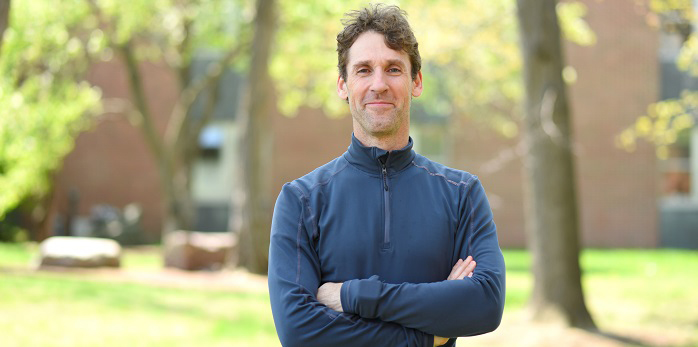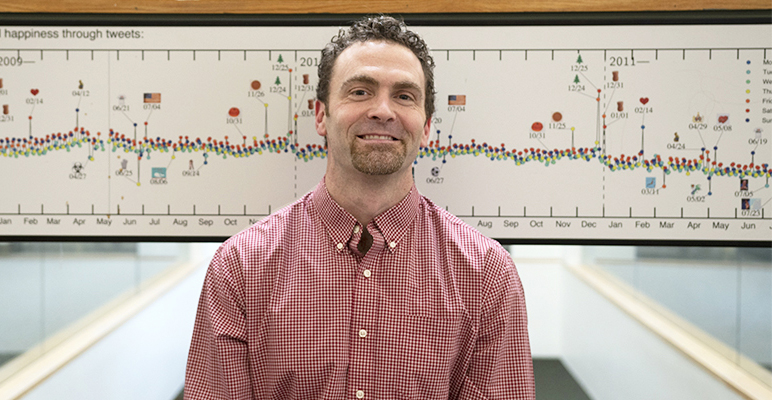When Professor Peter Dodds describes complex systems and data science, he talks about giving students the skills they need to solve problems and help the world.
Dodds, who arrived at UVM’s College of Engineering and Mathematical Sciences (CEMS) in 2006, helped develop the Vermont Complex Systems Center within UVM, a post-disciplinary team of faculty and students working on real-world, data-rich, and meaningful complex systems problems of all kinds.
“When we first started, data science wasn’t something people used as an expression, really,” says Dodds. “We’re pretty broad-minded, and systems can be about climate change, energy, or whatever system you can think about. It can be something that’s being made a mess of, something we’re causing, or something we’re saving.”
The Vermont Complex Systems Center is perhaps best known for its Hedonometer to measure happiness on Twitter or its research to define the six narrative arcs in fiction. Nearly a decade ago, CEMS launched a Graduate Certificate in Complex Systems and Data Science, a five-course program.
This spring, the 15-credit graduate certificate will be offered entirely online. The program is designed for students to complement their graduate degrees or professionals interested in enhancing their skills and knowledge in complex systems and analysis.
“This is something we built from the ground up. There are no textbooks for this, and we teach what we know,” Dodds says. “Maybe you’re really good at coding, but you should also know how to design, know something about physics, how to tell stories and how to write. We want people to leave here and go out and help the world.”
A Multidisciplinary Approach to Complex Systems and Data Science
Students in the UVM Complex Systems and Data Science certificate program are required to have a bachelor’s degree and demonstrated proficiency in calculus, probability and statistics, and computer programming.
Credits earned in the graduate certificate program can be applied to a UVM master’s or doctoral degree in Complex Systems and Data Science.
Students in the program learn:
- Methods of data acquisition, storage, manipulation, and curation
- Visualization techniques, with a potential for building high-quality web-based applications
- Uncovering complex patterns and correlations in systems through data-fueled machine learning and genetic programming
- Powerful ways of identifying and extracting explanatory, mechanistic stories underlying complex systems—not just how to use black-box techniques
Offered by CEMS, the graduate certificate program is housed within UVM’s Graduate College, which prides itself on working across several departments and areas of study.
“The ethos of complex systems is that it’s without disciplinary boundaries,” says Complex Systems Program Director Juniper Lovato. “We want to instill in students, who are working across disciplines, that it’s important to understand the complex systems we live in and to work with subject matter experts in different fields. It’s a different way to think about science and research that is not to be constrained by academic boundaries.”
For Dodds, it also comes down to seeing the bigger picture.
“It’s really fundamental to think of how things spread—there are social contagions and biological contagions. How do systems fail? How do things break down?” Dodds says. “We are in the middle of a pandemic, so there’s one example. Beirut is also an example as that’s a bureaucratic system that has failed. The question is, how do you create things that don’t fall apart?”
The spring application deadline for the UVM Graduate Certificate in Complex Systems and Data Science is Nov. 1, 2020.
Learn more about the UVM Graduate Certificate in Complex Systems and Data Science




